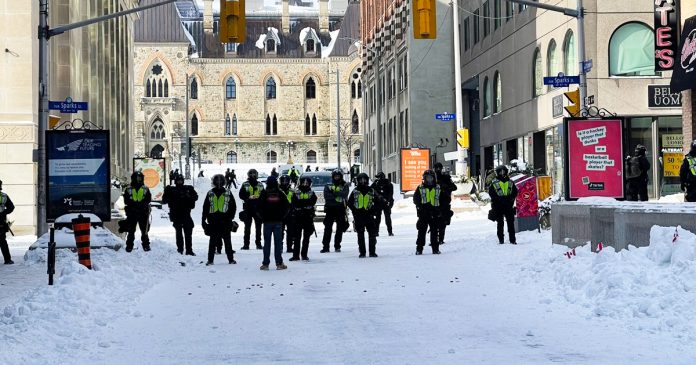The third day of the legal challenge to the government’s use of the Emergencies Act saw federal lawyers argue that the powers used to end the Freedom Convoy protests in Ottawa were “targeted and limited in scope.”
“The use of emergency powers was targeted and limited,” said government lawyers.
John Provart, a lawyer for the attorney general of Canada, claimed that the protests breached the threshold of what is considered lawful and pushed to portray the Convoy protests as going beyond reasonable limits.
“Coercion and intimidation are not protected under lawful assembly.”
Provart said claims that the protests were under control before the emergency powers were invoked was “little short of revisionist history.”
The government made the case that the powers were invoked in order to end blockades and prevent further demonstrations in other parts of the country.
“The powers were used to prevent attendance, to limit harmful protest activities, and as a precaution to prevent amplification,” said Provart.
“The nature of the protest was massive, coercive, and filled with people with different motivations,” said government lawyers alluding to the minimal presence of off-colour flags and hate symbols.
Federal lawyers stated that the measures were “balanced and well-proportioned” to the threats suggested by the Convoy, but provided no examples of violence or other serious threats to national security.
Canadian Constitution Foundation (CCF) lawyers brought the court’s attention to the freezing of personal bank accounts during the protests.
“There was no process for unfreezing bank accounts,” said CCF lawyers. “No one had their accounts unfrozen simply because they left Ottawa.”
Government lawyers claimed that freezing personal accounts were used as an “economic incentive” for people to leave protest areas.
CCF lawyer Janani Shanmuganathan said that the Emergencies Act infringed on Section 2 of the Canadian Charter of Rights and Freedoms, saying that the measures were too broad, affecting even people walking through protest sites.
“These are people who are engaged in peaceful political expression and whose only relationship with the people doing these so-called specific harms is simply being at the same event,” she said.
Justice Richard Mosley has reserved his decision until a later time.
“Why continue to challenge the use of the Emergencies Act?” is a question we get a lot,” wrote the Canadian Civil Liberties Association in a statement after the hearings. “The answer is fairly simple: only the courts can assess whether the government’s use of the Act, and the measures it imposed, were legally justified and complied with the Charter.”
“The outcome of this case can’t change the past, but it can help guide future governments and provide transparency to Canadians about the use of exceptional emergency laws.”
In its official report released in February, the Public Order Emergency Commission has ruled that Prime Minister Justin Trudeau’s use of the Emergencies Act to quash Freedom Convoy protesters last year was justified.
